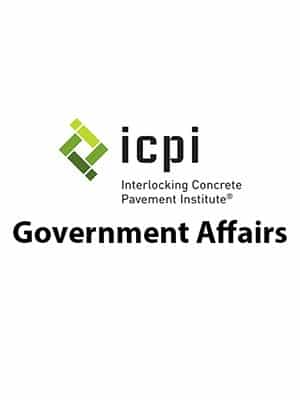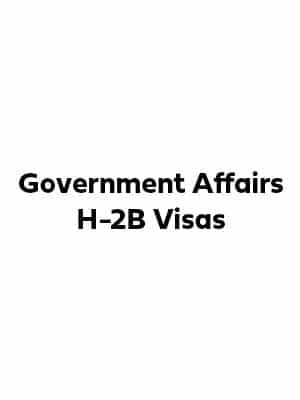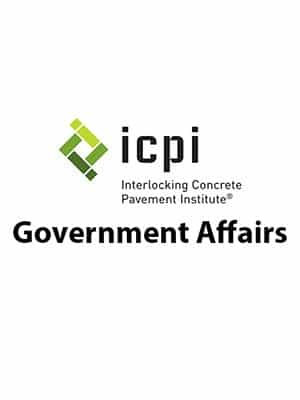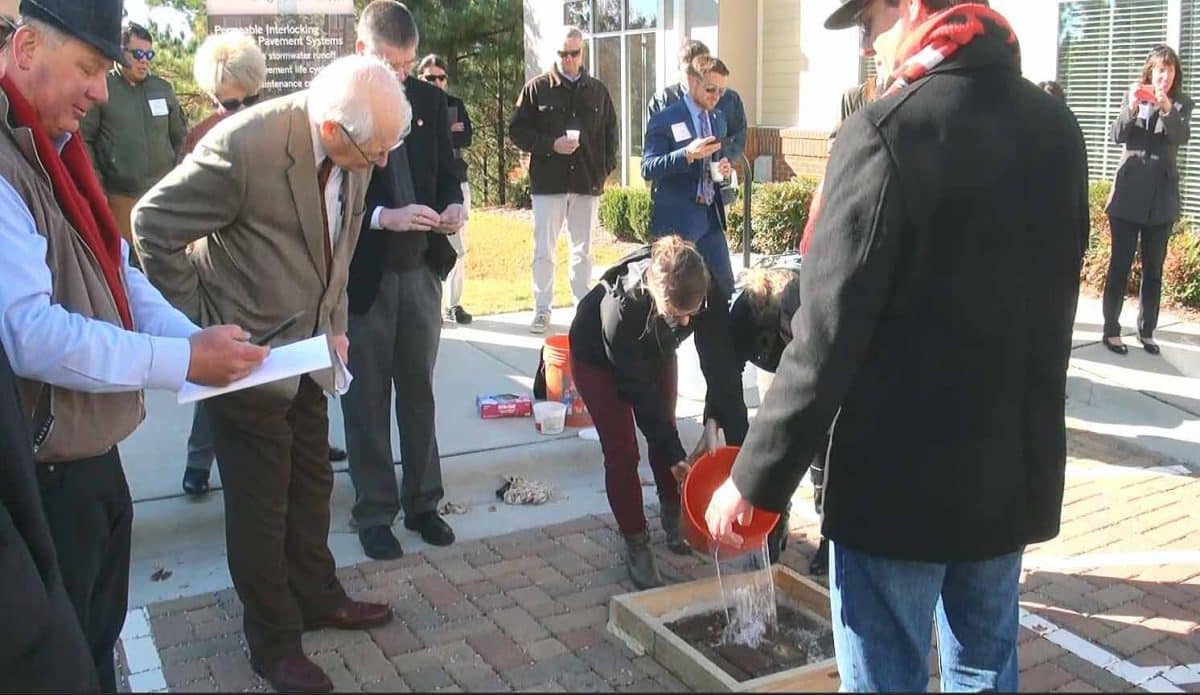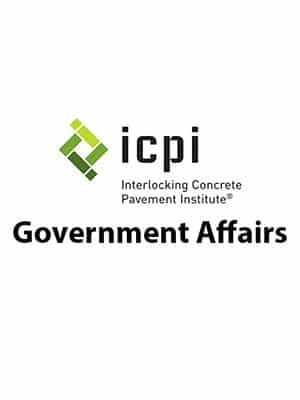ICPI Government Affairs Update – August 2021
At this writing, there is a surge on infrastructure bills on both sides of the Hill, in both the authorizing committees in the House and Senate, and in the Appropriations Committee in the House. There are three main infrastructure bills that we highlight in this report, focusing on key provisions affecting permeable pavements and stormwater action.
Authorizations: the House “Invest in America” Act, HR3684 (aka the House infrastructure bill)
We begin by addressing developments in the two authorizing committees, the House Transportation and Infrastructure Committee (House TIA) and the Senate Environment and Public Works Committees (Senate EPA), the two lead Hill committees on infrastructure policy. House TIA goes first.
House TIA introduced, and subsequently passed on the House floor, the Invest in American Act, HR3684. Focusing on permeables, this House bill includes a provision that would expand USDOT’s definition of “protective features” for the purposes of relevant USDOT/FHWA programs to include “permeable pavements for stormwater management.”
This “protective features” provision was added to the Invest in America Act subsequent to ICPI’s overtures to House TIA seeking greater direction for USDOT to conduct work on permeable pavements as part of the Department’s overall stormwater authority. ICPI is hopeful that if permeable pavements are specifically identified in USDOT’s authorization as a protective measure under the Department’s programs, it will elevate the Department’s commitment to involving permeable pavements in USDOT’s plans, programs and grant opportunities.
Next, we point to Section 1604 that would create a (quoting from Invest in America) STORMWATER BEST MANAGEMENT PRACTICES STUDY. Not later than 180 days after enactment, USDOT would be directed to enter into an agreement with the Transportation Research Board of the National Academy of Sciences to under which the TRB would conduct a study to estimate pollutant loads from stormwater runoff from highways and pedestrian facilities eligible for assistance under the U.S. Code, to inform the development of appropriate total maximum daily load requirements; to provide recommendations (including recommended revisions to existing laws and regulations) regarding the evaluation and selection by State departments of transportation of potential stormwater management and total maximum daily load compliance strategies within a watershed, including environmental restoration and pollution abatement carried out under section 328 of title 23, U.S. Code; to examine the potential for the Secretary to assist State departments of transportation in carrying out and communicating stormwater management practices for highways and pedestrian facilities that are eligible for assistance under title 23, U.S. Code, (some elements omitted due to length). The study would include USDOT/FHWA, the Secretary of Agriculture, the Secretary of the Army acting through the Chief of Engineers, State departments of Transportation, with input from stakeholders with experience in implementing stormwater management practices for projects (we would presume ICPI to qualify as such), and educational and technical stormwater management groups. The legislation would further call for a report to be generated to be circulated among the participants as well as the key committees in the House and Senate. Further, the report would be intended to be updated periodically.
ICPI feels this study can provide a solid and impressive platform to link the importance of stormwater management (for which pavers could provide an important contribution) as a core feature of USDOT/FHWA thinking and its mission. ICPI is in an excellent position to participate as a subject matter expert stakeholder educating USDOT/FHWA on the beneficial role of permeable pavements.
Throughout the Invest in America Act, there is a recurrent supportive theme elevating the importance of stormwater management. Some of the provisions explicitly reference the role of innovative pavement materials in helping achieve stormwater management. We expect pavers to satisfy the congressional intent of these provisions. Many of the thirty-some references to stormwater advance not only the importance of stormwater management as a priority in its own right, but also the direct relationship to pavements that can help address stormwater. ICPI is pleased to see that these policy benefits have achieved widespread recognition and acceptance on the Hill.
To be sure, there are other provisions of interest to ICPI in the House’s Invest in America bill, but these are the most directly related to the advocacy put forth by ICPI.
The House passed Invest in America and sent it to the Senate for consideration.
Authorizations: the Senate “bipartisan infrastructure” bill
We now shift to the U.S. Senate, and its version of an infrastructure bill that is generally referred to as “the bipartisan infrastructure bill”. As this report is being prepared on August 9, 2021, that bill is on the Senate floor with amendments under consideration. We expect a vote on final passage early August 10. We expect the bill to pass with substantial bipartisan support.
The Senate bill contains not only its own stormwater management study, but also a (quoting from the bill) PERMEABLE PAVEMENTS STUDY. USDOT would be required to gather existing information on the effects of permeable pavements on flood control in different contexts, including in urban areas, and over the lifetime of the permeable pavement, to perform research to fill gaps in the existing information to develop models for the performance of permeable pavements in flood control; and best practices for designing permeable pavement to meet flood control requirements.
ICPI lauds all efforts by the Hill to direct agency attention to the public policy benefits of permeable pavements.
The Senate bill also contains provisions for detailed stormwater management study quite like what the House requires in its Invest in America.Rather than reprint the Senate language here, we can say the House and Senate provisions are substantively similar.
As we alluded earlier, that there are major other issues (for example, important water resources construction chapters) in both bills with many $billions in funding that may be of interest to ICPI members. But we focus on ICPI’s efforts on permeables and stormwater.
Status: at this time, the Senate bill remains under floor consideration. We expect it to pass on the Senate floor on August 10. The House and Senate will next need to convene a House-Senate conference to resolve all the differences between the House Invest in America Act and the Senate “bipartisan infrastructure” version, and then send the identical compromise “conference report” back to both Houses for up-or-down votes on final passage. The House has already adjourned for the August recess, so only negotiations would occur during the remainder of the August recess. After both Houses reconvene in September, and if a final conference report is achieved, we think it highly likely that it would be passed in both Houses of Congress and then sent to the White House to be signed into law. We think it virtually certain that the President would sign such a bill into law.
This concludes the report on infrastructure authorizations. We now shift to appropriations, specifically House THUD Appropriations for USDOT/FHWA in FY22.
Appropriations: the House FY22 THUD Appropriations bill and committee report
The House has indeed passed its FY22 THUD Appropriations as part of a larger package of funding bills and has sent that package to the Senate for consideration.
The House Committee Report to accompany the FY22 THUD Appropriations bill contains language advocated by ICPI in a joint conversation with subcommittee staff. The report language eventually adopted by the Appropriations Committee is as follows:
Permeable pavements. —The Committee continues to encourage the Secretary to accelerate research, demonstration, and deployment of permeable pavements to achieve flood mitigation, pollutant reduction, stormwater runoff reduction, environmental conservation, and resilience for new road construction and retrofit of existing roads. The Committee encourages the Secretary to conduct structural evaluations of flood-damaged pavements, with emphasis on local roads and highways subject to flooding and extended periods of inundation, to understand the mechanisms of flood damage and how permeable pavements might be used to prevent or reduce damage from future flooding. Furthermore, the Secretary is encouraged to work with the Federal Emergency Management Agency (FEMA) and the Environmental Protection Agency (EPA), as both agencies are also doing work in the area of permeable pavements and a cross-agency collaboration may yield more innovation. As such, the Committee directs the Department to submit a report within 240 days of enactment of this Act to the House and Senate Committees on Appropriations detailing current efforts, utilization, and research within FHWA and efforts made with FEMA and EPA.
ICPI applauds the House interest in a collaboration among USDOT, FEMA and EPA in this regard. ICPI would be happy to offer technical assistance in such a collaboration.
The package of funding bills that includes THUD passed the House and is now in the Senate for consideration after the August recess. New appropriations bills are required to be enacted by September 30. In recent years, appropriations bills have rarely been enacted without considerable eleventh-hour negotiations, but we do not anticipate a government shutdown at this time. The real issue will be whether the new FY22 appropriations bills will be able to pass, or whether a stopgap Continuing Resolution would be required to continue funding under current appropriations. For obvious reasons, ICPI would prefer passage of the FY22 bill, with the report language reprinted above, rather than a CR.
On the horizon: a highly contentious, fully partisan Budget Reconciliation bill
Up to this point in this report, we have focused on infrastructure items, both authorizations and appropriations, that are, for the most part, bipartisan in nature, or at least sufficiently reconcilable to obtain bipartisan Senate support.
That degree of comity will not be continued with respect to the next bill on the Senate agenda, the FY22 Budget Reconciliation (“the BR”) bill.
The White House and Hill Democratic leaders have settled on a two-bill strategy: first, the bipartisan infrastructure bill that can attract the GOP support that the White House wants to demonstrate a commitment, or at least desire for, bipartisanship; and second bill, the BR, that will address all the remaining partisan priorities from all sides of the Democratic Party continuum.
The BR addresses issues such as tax increases, global warming/carbon dioxide emissions reductions, labor issues, immigration issues, social issues and more. This list of partisan issues has been looking for a legislative vehicle since the 117th Congress was seated. They are some of the most election-sensitive issues in American politics.
This second bill will need to be put forward as a BR in order to invoke the Budget Reconciliation rules. If the Democratic leadership can successfully invoke the BR rules, it will eliminate the roadblock of a Senate filibuster. Thus, if all the 50 Senate Democrats can support such a BR, they may have the absolute minimum votes necessary to pass such a bill without any GOP support.
There are too many political and mathematical variables to address in this report as to whether such a parliamentary strategy can be successful. There are other roadblocks involving interpretations of the Budget Reconciliation Act, and whether the privileged voting under BR would apply substantively to some of the key issues the Democrats would like to include. ICPI will pay close attention to the BR.
At this writing, the Senate Democratic leadership are introducing the BR and hope to pass it soon after completing work on the bipartisan infrastructure bill and prior to adjourning for the August recess. It appears the Democrats may have the minimum number of votes for passage at this time, but whether unanimous Democratic can be held throughout the BR process is unknown.
H-2B Worker Visa action: increases in visas, a gauntlet of amendments in opposition
There has been considerable recent action regarding the H-2B worker visa program. H-2B remains a priority for ICPI. ICPI is pleased to work with business advocate allies on H-2B and uses material drafted by H-2B allies in this report.
USCIS recently announced that employers may file H-2B petitions for returning workers under the FY21 H-2B supplemental visa temporary final rule. Employers may take this action if they are likely to suffer irreparable harm without these additional workers. Returning workers are defined as workers who were issued an H-2B visa or otherwise granted H-2B status in FY 2018, 2019, or 2020. USCIS will accept petitions for returning workers until Sept. 15, 2021, or until the remainder of the cap is reached, whichever occurs first. Any petitions that arrive after this cap has been reached will be rejected. USCIS previously announced having received enough petitions for the 16,000 visas initially made available for returning workers under the rule. We refer ICPI members to the USCIS website for more information.
During House FY22 Appropriations consideration for USDOL and USDHS funding, appropriators added language to the H-2B worker visa provisions that would further prompt the Secretary to make additional worker visas available during FY22. ICPI supports this language.
Further during the appropriations process in the House, pro-H-2B Members of Congress successfully resisted several proposals that could have effectively gutted the H-2B program. Proposals would-
-Prohibit industries from using the H-2B program if they experienced unemployment
in any of the previous 12 months over 10%;
-Prohibit construction industries from using the program even in seasonal locations or occupations;
-Increase the baseline for wages to at least 150% of the federal or state minimum wage, whichever is higher;
-Require wage compliance with a collective bargaining agreement for your industry in the area, even if a company is not a party to the agreement;
-Ban participation in the program for labor/workforce related infractions outside of the scope of the H-2B program.
ICPI and other business advocates opposed all these amendments.
The House package of appropriations bills that contains the H-2B provisions has passed the House and awaits Senate action following the August recess.
WOTUS, Waters of the U.S. rule (Clean Water Act): the saga continues
As expected, EPA and the U.S. Corps of Engineers will be commencing efforts soon to replace the Trump Administration version of the Water of the U.S. definition, which defines the waterways subject to the Clean Water Act and related issues such as water quality and stormwater management. Agency listening sessions are expected to begin in August.
During the promulgation of a new version of the rule, the Biden White House has said it intends to temporarily reinstitute the WOTUS rule that existed prior to the Obama Administration changes implemented in 2015.
ICPI will monitor developments.
Labor issues: the PRO Act, NLRB
The Senate HELP Committee held a hearing on the PRO Act (The People’s Right to Organize Act, S420, in July. Quoting from the bill’s abstract, the bill expands various labor protections related to employees’ rights to organize and collectively bargain in the workplace. Among other things, it revises the definitions of employee, supervisor, and employer to broaden the scope of individuals covered by fair labor standards; permits labor organizations to encourage participation of union members in strikes initiated by employees represented by a different labor organization (i.e., secondary strikes); and prohibits employers from bringing claims against unions that conduct such secondary strikes.
The bill also allows collective bargaining agreements to require all employees represented by the bargaining unit to contribute fees to the labor organization for the cost of such representation, notwithstanding a state law to the contrary; and expands unfair labor practices to include prohibitions against replacement of, or discrimination against, workers who participate in strikes.
The bill makes it an unfair labor practice to require or coerce employees to attend employer meetings designed to discourage union membership and prohibits employers from entering into agreements with employees under which employees waive the right to pursue or a join collective or class-action litigation.
Further, the bill addresses the procedures for union representation elections, modifies the protections against unfair labor practices that result in serious economic harm, and establishes penalties and permits injunctive relief against entities that fail to comply with National Labor Relations Board orders.
ICPI and many other business organizations oppose the PRO Act. ICPI signed a joint industry letter opposing the PRO Act. The PRO Act’s future remains uncertain, given that it would be nearly certain to draw a filibuster in the Senate.
In another labor development, the Senate recently approved two Democratic nominees to take seats on the National Labor Relations Board. It is widely expected that when these new members are seated, giving Democrats the majority on the Board, there will be a quite significant shift on the Board. ICPI and other business advocates will monitor NLRB developments closely when the new Board is seated.
